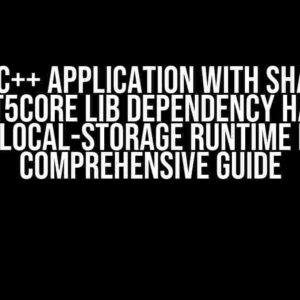In the realm of C and C++ programming, the concept of lvalues and rvalues can be a bit perplexing, especially when it comes to address-of expressions. You may have wondered why an “address-of” expression, denoted by the unary `&` operator, doesn’t qualify as an lvalue. In this article, we’ll delve into the depths of C and C++ semantics to uncover the reasoning behind this seemingly counterintuitive behavior.
Understanding lvalues and rvalues
Before we dive into the specifics of address-of expressions, let’s briefly review the fundamental concepts of lvalues and rvalues.
In C and C++, an lvalue (short for “left value”) is an expression that refers to a memory location that can be assigned a value. In other words, an lvalue is a value that can appear on the left-hand side of an assignment operator (=). Examples of lvalues include:
- Variables (e.g., `int x;`)
- Array elements (e.g., `arr[0]`)
- Struct or union members (e.g., `struct_point.x`)
- Pointer dereferences (e.g., `*ptr`)
On the other hand, an rvalue (short for “right value”) is an expression that represents a value that can be assigned to an lvalue. Rvalues can appear on the right-hand side of an assignment operator. Examples of rvalues include:
- Literals (e.g., `5`, `”hello”`)
- Function calls (e.g., `rand()`)
- Cast expressions (e.g., `(int) 3.14`)
- Temporary objects (e.g., `std::string(“hello”)`)
The Address-of Operator (&)
The unary `&` operator, also known as the address-of operator, returns the memory address of its operand. When you use `&` on a variable, it yields a pointer to that variable. For instance:
int x = 5;
int* px = &x; // px now points to xThis raises an interesting question: if `&x` returns a pointer to `x`, shouldn’t it be an lvalue, given that it refers to a memory location?
The Surprising Truth
Despite its intuitive appeal, an address-of expression is not an lvalue. According to the C and C++ standards, the `&` operator yields an rvalue, not an lvalue. This means you cannot assign a value to the result of an address-of expression.
&x = 10; // Error: lvalue required as left operand of assignmentThis may seem counterintuitive, but there’s a solid reason behind this design decision.
Why Address-of Expressions Are Not lvalues
The main reason address-of expressions are not lvalues is that they do not identify a memory location that can be modified. When you use `&` on a variable, you’re not getting a reference to the variable itself, but rather a temporary value that represents the variable’s address.
Think of it like this: the address-of operator returns a pointer value, not a pointer variable. This subtle distinction is crucial.
A pointer variable, like `px` in the example above, is an lvalue because it occupies memory space and can be assigned a new value. However, the expression `&x` is not a pointer variable; it’s a temporary rvalue that evaluates to the address of `x`. You can’t assign a new value to this temporary result because it’s not a named object.
Implications and Consequences
The fact that address-of expressions are not lvalues has several implications and consequences:
-
You cannot assign a value to the result of an address-of expression, as shown earlier.
-
You cannot use an address-of expression as the left operand of an assignment operator.
-
You cannot use an address-of expression as an argument to a function that expects a non-const reference or a pointer to a non-const type.
-
In C++11 and later, you cannot use an address-of expression as the operand of a decltype specifier.
Workarounds and Alternatives
So, what can you do if you need to modify the address stored in a pointer or reference? There are a few workarounds and alternatives:
-
Use a pointer variable: Instead of using an address-of expression, declare a pointer variable and assign the address of the variable to it.
-
Use a reference: If you’re working with references, you can assign a new value to the referenced variable.
-
Use std::addressof: In C++11 and later, you can use the `std::addressof` function, which returns the address of its operand as an rvalue. This function is useful when working with objects that override the unary `&` operator.
Conclusion
In conclusion, the reason an “address-of” expression is not an lvalue is that it returns a temporary rvalue representing the address of its operand, rather than a named object that can be modified. Understanding this subtle distinction is crucial for writing correct and effective C and C++ code. By grasping the nuances of lvalues, rvalues, and the address-of operator, you’ll become a more confident and proficient programmer.
| Expression | lvalue? | rvalue? |
|---|---|---|
| x | yes | no |
| &x | no | yes |
| *px | yes | no |
| 5 | no | yes |
This table summarizes the lvalue and rvalue status of various expressions, including the address-of operator.
By recognizing the importance of lvalues and rvalues in C and C++ programming, you’ll unlock the secrets of the address-of operator and become a master of memory management and expression evaluation.
Frequently Asked Question
Get ready to unearth the mysteries of the address-of expression!
Why is an “address-of” expression not an lvalue?
An “address-of” expression, denoted by the unary `&` operator, is not an lvalue because it doesn’t refer to a memory location that can be assigned a new value. It simply returns the memory address of its operand, which is an rvalue. Think of it like a read-only label that points to a memory location, but isn’t the location itself.
But I can use the address-of operator to get the address of an lvalue, right?
Yes, you’re absolutely right! The address-of operator can be used to get the address of an lvalue, like a variable or an array element. However, the result of the address-of operator itself is an rvalue, not an lvalue. You can’t assign a new value to the result of the address-of operator.
What’s the difference between an lvalue and an rvalue?
An lvalue (short for “left value”) is an expression that refers to a memory location that can be assigned a new value. Examples include variables, array elements, and function parameters. On the other hand, an rvalue (short for “right value”) is an expression that refers to a temporary value that can be assigned to an lvalue. Examples include literals, function calls, and the result of the address-of operator. Think of it like a source and a destination: lvalues are the destinations, and rvalues are the sources.
Can I use the address-of operator on an rvalue?
In general, no, you can’t use the address-of operator on an rvalue. The address-of operator requires an lvalue as its operand, because it needs to return the memory address of that lvalue. If you try to use the address-of operator on an rvalue, the compiler will throw an error. However, there are some exceptions, like string literals in C++, which can be used as lvalues in certain contexts.
What’s the purpose of the address-of operator in programming?
The address-of operator is used to pass variables by reference to functions, allowing the function to modify the original variable. It’s also used to create pointers, which are essential in dynamic memory allocation and data structures. Additionally, the address-of operator is used in pointer arithmetic and memory management, making it a fundamental concept in programming.








